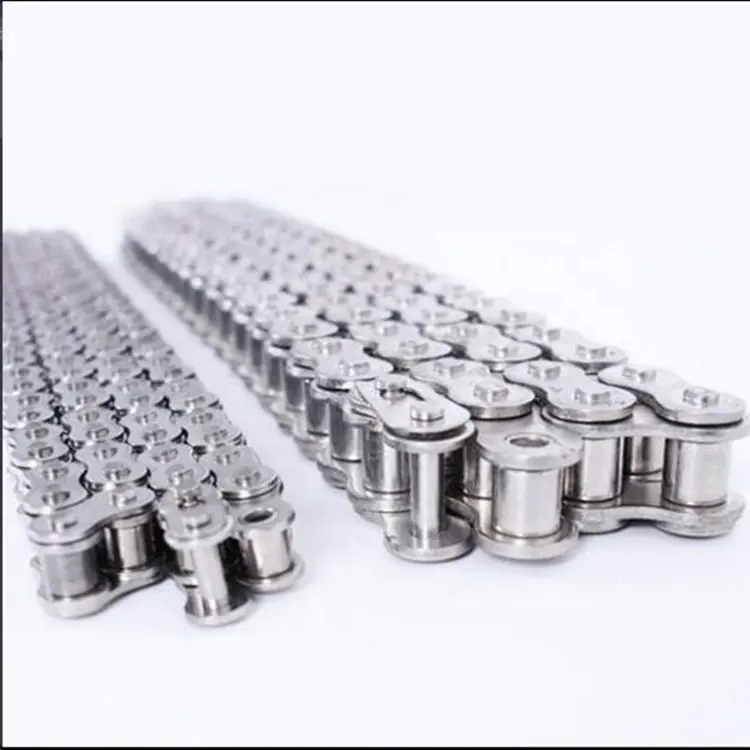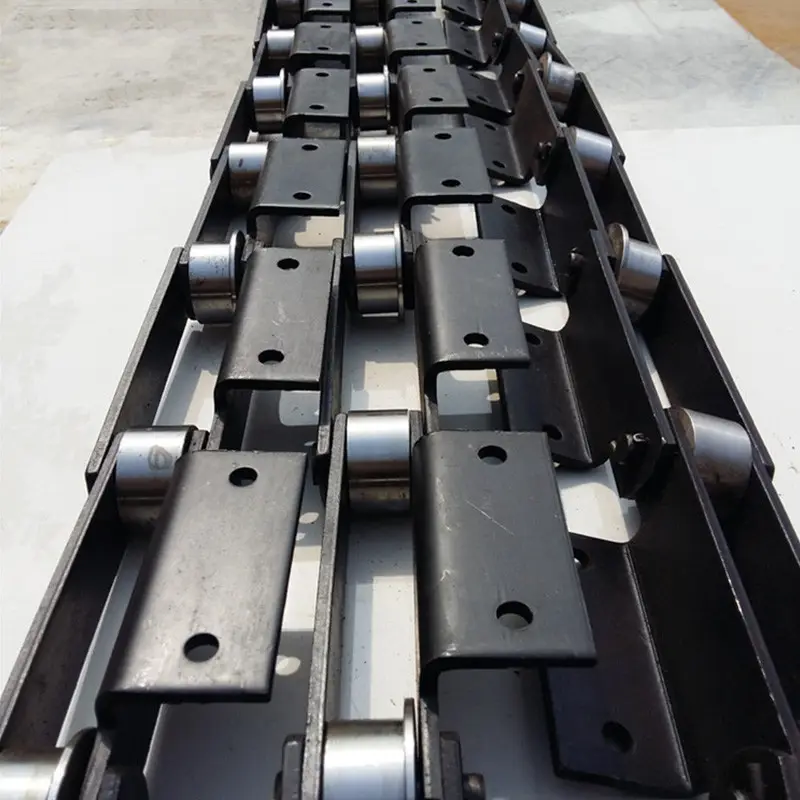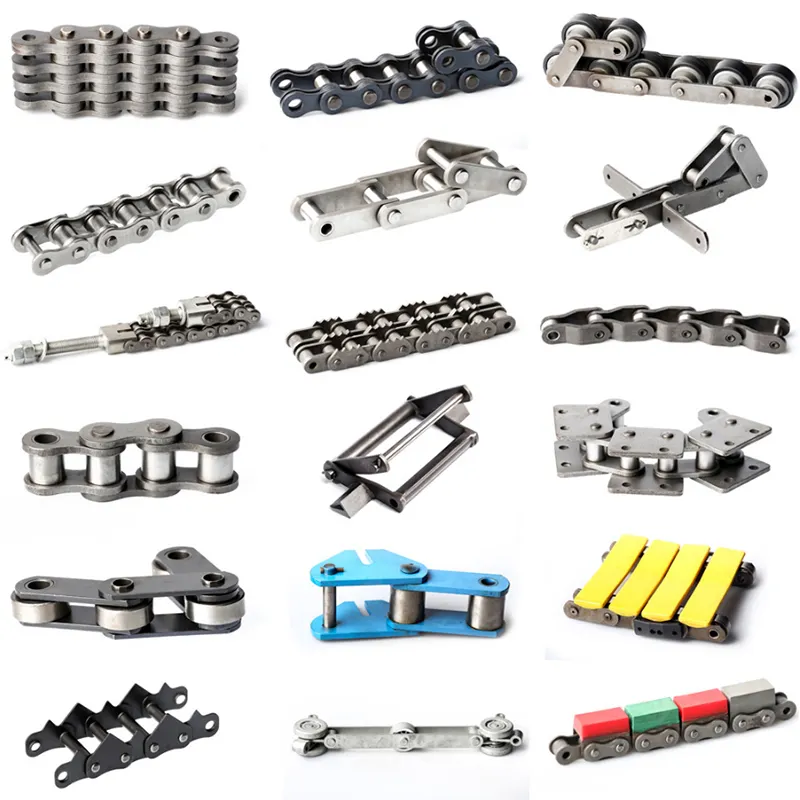Product Description
Stainless Steel Chain
Strength:
1. For Free Samples
2. Prompt Delivery
3. Green Product
4. International Approvals
5. Experienced Staff
Catalogue
1. Stainless steel roller chains
2. Short pitch stainless steel conveyor chain with attachments
3. Double pitch stainless steel conveyor chains
4. Double pitch stainless steel conveyor chain with attachments
5. Stainless steel hollow pin chains
Why Choose Us?
1. HangZhou Xihu (West Lake) Dis.hua Chain Group Co., Ltd established in 1991, we have 5 subsidiaries in China and have 6 subsidiaries abroad;
2. We covering a production area of 200, 100 square meters, have more than 1, 800 sets of advanced equipment and over 3, 100 highly skilled employees, the annual production capacity has exceeded 20, 000, 000meters;
3. We specialized in producing all kinds of standard chains and special chains, such as A or B series chains, driving chains, conveyor chains, dragging chains, agricultural chains and so on;
4. We have obtained ISO9001, ISO14001, ISO16969, AAA and API certificates.
We look CHINAMFG to receiving your enquires soon.
/* January 22, 2571 19:08:37 */!function(){function s(e,r){var a,o={};try{e&&e.split(“,”).forEach(function(e,t){e&&(a=e.match(/(.*?):(.*)$/))&&1
| Usage: | Transmission Chain |
|---|---|
| Material: | Stainless steel |
| Surface Treatment: | Polishing |
| Feature: | Heat Resistant |
| Chain Size: | 1/2"*3/32" |
| Structure: | Roller Chain |
| Customization: |
Available
| Customized Request |
|---|

What are the benefits of using a maintenance-free transmission chain?
Using a maintenance-free transmission chain offers several advantages in terms of convenience, cost savings, and overall performance. Here’s a detailed explanation:
1. Reduced Maintenance Requirements: Maintenance-free transmission chains are designed to operate without the need for regular lubrication or additional maintenance tasks. This eliminates the time and effort typically associated with lubrication and inspection schedules, reducing overall maintenance requirements and associated costs.
2. Increased Operational Efficiency: Maintenance-free chains often incorporate specialized self-lubricating materials or coatings that provide excellent lubrication properties over an extended period. This helps to reduce friction, wear, and power losses, resulting in improved operational efficiency. The reduced friction also contributes to lower energy consumption and increased power transmission efficiency.
3. Extended Chain Life: Maintenance-free transmission chains are engineered to have a longer service life compared to traditional lubricated chains. The use of self-lubricating materials or coatings helps to minimize wear, corrosion, and elongation, ensuring the chain remains in optimal condition for an extended period. This leads to reduced downtime, fewer chain replacements, and lower replacement costs.
4. Clean and Environmentally Friendly: Maintenance-free chains do not require external lubrication, which means there is no need for oil or grease application. This results in a cleaner and more environmentally friendly working environment, as there is no risk of oil contamination or leakage. Additionally, maintenance-free chains often generate less noise due to reduced friction, contributing to a quieter working environment.
5. Application Versatility: Maintenance-free transmission chains are available in various types and sizes, making them suitable for a wide range of applications. They can be used in industries such as packaging, food processing, automotive, material handling, and many others where reliability, cleanliness, and reduced maintenance are essential.
It’s important to note that while maintenance-free transmission chains offer numerous benefits, they may not be suitable for all applications. Factors such as load capacity, operating conditions, and environmental factors should be considered when determining the appropriate chain type. Consulting with chain manufacturers or industry experts will ensure the selection of a maintenance-free transmission chain that best meets the specific application requirements.

Can transmission chains be used in high-torque applications?
Yes, transmission chains are commonly used in high-torque applications due to their ability to transmit power efficiently. Here’s a detailed answer to the question:
1. Robust Power Transmission: Transmission chains are designed to handle significant amounts of power transmission, including high-torque applications. They are capable of transferring torque from the driving source to the driven components effectively.
2. Load Capacity: Transmission chains are engineered to withstand heavy loads and high levels of torque. They are designed with appropriate material strength, chain pitch, and components to handle the specific torque requirements of the application.
3. Diverse Applications: Transmission chains are utilized in various high-torque applications across industries such as automotive, construction, mining, agriculture, and manufacturing. They are commonly used in power transmission systems, machinery, equipment, conveyors, and other mechanisms that require efficient torque transfer.
4. Compatibility with Sprockets: Transmission chains work in conjunction with sprockets, which are designed to engage with the chain links and transfer torque. The design and selection of appropriate sprockets ensure smooth and reliable torque transmission in high-torque applications.
5. Strength and Durability: Transmission chains are manufactured using high-strength materials such as alloy steel, stainless steel, or heat-treated steels to provide the necessary strength and durability required for high-torque operations. These materials can withstand the forces generated by high levels of torque without premature wear or failure.
6. Proper Lubrication and Maintenance: To ensure optimal performance in high-torque applications, it is essential to maintain proper lubrication and perform regular maintenance on the transmission chain. Adequate lubrication reduces friction, heat generation, and wear, thereby prolonging the chain’s lifespan and preserving its torque transmission capabilities.
It’s important to consult with industry experts or manufacturers to select the appropriate transmission chain and ensure it meets the specific torque requirements of the application. Additionally, following recommended installation and maintenance practices will help maximize the performance and longevity of the transmission chain in high-torque applications.

What materials are commonly used in manufacturing transmission chains?
Transmission chains are manufactured using various materials, each offering different properties and advantages. The choice of material depends on the specific application requirements, including load capacity, wear resistance, and environmental conditions. Here are some commonly used materials in the manufacturing of transmission chains:
- Carbon Steel: Carbon steel is a popular choice for transmission chains due to its excellent strength, durability, and affordability. It provides good wear resistance and can handle moderate loads.
- Stainless Steel: Stainless steel chains are highly resistant to corrosion and offer superior durability in challenging environments. They are commonly used in industries where cleanliness and hygiene are critical, such as food processing and pharmaceuticals.
- Alloy Steel: Alloy steel chains are alloyed with various elements to enhance their mechanical properties. They offer higher strength, increased wear resistance, and improved fatigue resistance compared to carbon steel chains.
- Plastic: Plastic chains are lightweight, corrosion-resistant, and offer excellent chemical resistance. They are often used in applications where noise reduction, low friction, or non-magnetic properties are required.
- Non-metallic Composites: Non-metallic composite chains are made from materials such as fiberglass, carbon fiber, or Kevlar. These chains offer high strength-to-weight ratios, exceptional chemical resistance, and low friction characteristics.
It’s important to select the appropriate chain material based on the specific operating conditions and requirements of the application. Factors such as load capacity, speed, environmental conditions, and maintenance considerations should be taken into account when choosing the material for a transmission chain.


editor by CX 2024-05-08
